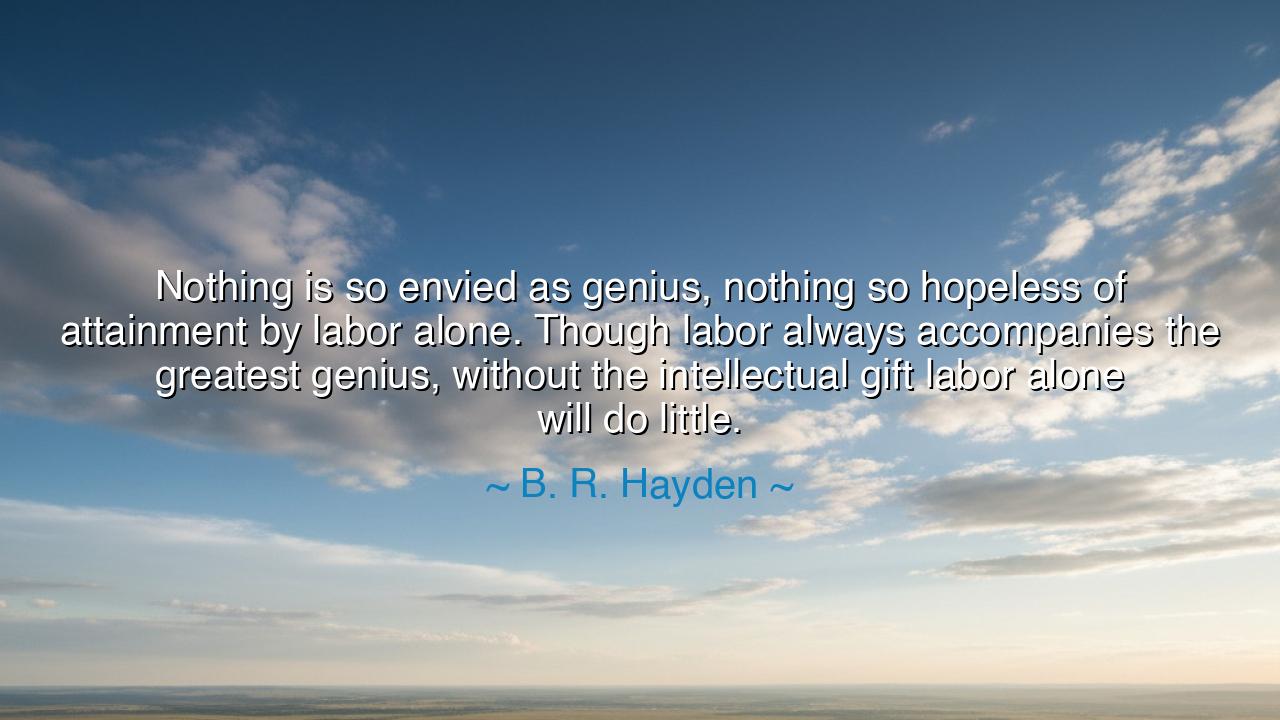
Nothing is so envied as genius, nothing so hopeless of attainment
Nothing is so envied as genius, nothing so hopeless of attainment by labor alone. Though labor always accompanies the greatest genius, without the intellectual gift labor alone will do little.






In the profound words of B. R. Haydon, the English painter and thinker, he declared: “Nothing is so envied as genius, nothing so hopeless of attainment by labor alone. Though labor always accompanies the greatest genius, without the intellectual gift labor alone will do little.” These words pierce through the illusions of ambition to reveal the eternal tension between talent and effort, between the divine spark that is bestowed and the human toil that refines it. Haydon, who himself struggled between vision and misfortune, speaks here not as a man of envy, but as one who understood deeply the nature of creative greatness — that it is both a gift from beyond and a responsibility within.
When Haydon speaks of genius, he does not refer to mere intelligence, nor to cleverness of craft. He speaks of that mysterious power that lifts human work into the realm of the timeless — that rare light which allows a mortal hand to touch the eternal. The poet who writes words that outlive empires, the painter whose brush captures the soul of the age, the inventor who alters the destiny of mankind — these are not merely industrious men, but men in whom the divine spark has taken root. This spark cannot be earned by effort alone; it is given, as the ancients said, by the gods themselves. And so, the world, seeing such brilliance, cannot help but envy it — for though one may imitate the work, one cannot summon the spirit.
Yet Haydon is no enemy of labor. He calls it the eternal companion of genius, the sacred duty by which the gift is realized. For genius, left idle, perishes like a seed left unplanted. The greatest minds have always been those who labored most — not to create their gift, but to honor it. Leonardo da Vinci spent years dissecting the human form to perfect his art; Beethoven composed even when deafness stole the very sound he loved. These were not men who relied on talent alone, but who understood that the union of inspiration and discipline is the true hallmark of greatness.
Haydon himself lived this struggle. A painter of immense vision, he devoted his life to grand historical canvases, striving to revive the nobility of art in an age of mediocrity. He labored tirelessly — yet recognition eluded him, and despair became his companion. His words on genius came not from comfort, but from the furnace of experience. He knew that while effort can refine skill, it cannot create the fire of originality. This truth, painful though it is, humbles both the gifted and the diligent: for the gifted must guard their flame, and the diligent must accept that not all fires can be kindled by will alone.
Consider Wolfgang Amadeus Mozart, the eternal child of music. From the age of five, he composed works that even the most learned masters could not fathom. Many tried to imitate him; none succeeded. His genius was not a product of study, though he studied; not a reward of labor, though he labored. It was a manifestation of grace — a light that appeared for a brief moment in human history and then was gone. And yet, Mozart’s life, like Haydon’s words, teaches us this paradox: while genius cannot be created by work, work is the vessel that allows genius to endure. Without the discipline of his hand, even Mozart’s brilliance would have vanished into the ether.
From this reflection, a great wisdom emerges. It is folly to envy genius, for envy blinds us to the truth that every soul is called to a different labor. Some are born to illuminate, others to build; some to invent, others to preserve. The divine spark may not burn equally in all, but every life can glow with purpose if joined to honest effort and devotion. Labor may not make a genius, but it will make a man noble. And if genius is a flame, then labor is the lamp that bears it — without which the fire cannot shine.
So let this be the teaching: honor the gifts you are given, but sanctify them through work. If genius has touched you, do not waste it in idleness; if it has not, do not despair, for diligence, integrity, and passion still yield greatness of another kind. The world does not need only Mozarts and Michelangelos; it needs also those who serve, who learn, who love, who build faithfully in their chosen craft. The wise man does not envy genius — he reveres it, learns from it, and continues his labor with quiet strength.
Thus, in the spirit of B. R. Haydon, remember this truth: the spark of genius may be rare, but the light of effort is within all. Envy not the gift, but emulate the discipline. For while few can command genius, every soul can command its own excellence, and in that striving lies the nobility of mankind.






AAdministratorAdministrator
Welcome, honored guests. Please leave a comment, we will respond soon